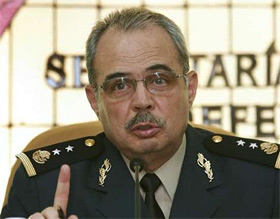 |
 |
 |
 News Around the Republic of Mexico | April 2006 News Around the Republic of Mexico | April 2006  
Mexico Army Finds Tons of Cocaine on Plane
 E. Eduardo Castillo - AP E. Eduardo Castillo - AP


| | Gen. Carlos Gaytan announces the cocaine seizure at a press conference. (AP) |
Mexico City — Mexican soldiers seized 5 1/2 tons of cocaine worth more than $100 million from a commercial plane arriving from Venezuela, Mexico's Defense Department announced Tuesday.

The army was waiting for the plane on Monday at the airport of Cuidad de Carmen, 550 miles east of Mexico City, after receiving information from Venezuelan and U.S. authorities, Gen. Carlos Gaytan told a news conference.

The cocaine was stacked in 128 black suitcases marked private.

Soldiers arrested Colombian Miguel Vazquez, 47, who was the plane's co-pilot, but the pilot escaped, Gaytan said. There were no passengers.

The soldiers also arrested two Mexicans who were waiting at the airport with another plane.

Gaytan said airport officials initially stopped soldiers from approaching the plane, claiming there was an oil leak and that it might explode. The officials are being investigated to see if they were in league with the traffickers, said Mexico's top drug prosecutor, Jose Luis Santiago Vasconcelos.

U.S. and Mexican officials say that cocaine and heroin is increasingly passing from Colombia through Venezuela to Mexico where it is smuggled into the United States. While drug traffickers used planes to smuggle large quantities of drugs in the 1990s, most Mexican traffickers now use land and sea routes.

A U.S. State Department report released in March said that Venezuela has become a key transit point for drugs because of "rampant corruption at the highest levels of law enforcement and a weak judicial system."

Venezuelan President Hugo Chavez suspended cooperation with the U.S. Drug Enforcement Administration in August, accusing its agents of spying. | 
 | |
 |



